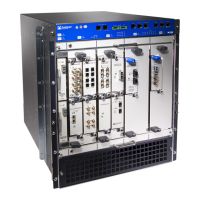The minimum front and rear clearance requirements depend on the mounting
configuration you choose. The minimum total clearance inside the cabinet is 30.70 in.
between the inside of the front door and the inside of the rear door.
NOTE: If you mount the router in a cabinet, be sure that sufficient room is
provided for cable management and cables.
Related
Documentation
M120 Cabinet Airflow Requirements on page 83•
• Installing the Mounting Hardware for a Front-Mount Four-Post Rack or Cabinet on
page 119
M120 Cabinet Airflow Requirements
When you mount the router in a cabinet, you must ensure that ventilation through the
cabinet is sufficient to prevent overheating. Following is a list of requirements to consider
when planning for chassis cooling:
•
Ensure that the cool air supply you provide through the cabinet can adequately dissipate
the thermal output of the router. Table 49 on page 86 lists the router's environmental
specifications, including its operating temperature and thermal output.
•
Ensure that the cabinet allows the chassis hot exhaust air to exit from the cabinet
without recirculating into the router. An open cabinet (without a top or doors) that
employs hot air exhaust extraction from the top allows the best airflow through the
chassis. If the cabinet contains a top or doors, perforations in these elements assist
with removing the hot air exhaust. For an illustration of chassis airflow, see Figure 7 on
page 20.
•
Route and dress all cables to minimize the blockage of airflow to and from the chassis.
Related
Documentation
M120 Cabinet Size and Clearance Requirements on page 82•
• Installing the Mounting Hardware for a Front-Mount Four-Post Rack or Cabinet on
page 119
M120 Rack Mounting Requirements
The router can be installed in a rack. Many types of racks are acceptable, including
four-post (telco) racks and open-frame racks. An example of an open-frame rack appears
in Figure 23 on page 85. Table 48 on page 84 summarizes rack requirements and
specifications for the M120 router.
83Copyright © 2018, Juniper Networks, Inc.
Chapter 9: Preparation Overview

